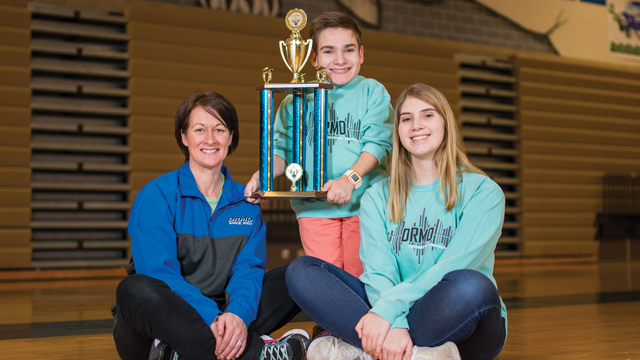What’s that you hear about millennials? They’re entitled, materialistic, and lazy? They’re not team players, and they want a trophy just for showing up?
That myth is busted. This generation of high school students has shown that they are committed to improving society and that they’re not afraid of hard work. Meet three groups of students and hear how they’re changing the world – one bowling pin, whip and nae nae, or impassioned debate at a time. And while they’re doing that, they’ve found out a lot about their communities and themselves.
Deep Run High School
Dancing All Night
As a nervous freshman coming into a big high school, Abby Bittner attended an interest meeting for something she knew nothing about: Deep Run’s annual Marathon Dance. “I’d never even been to a dance before,” she said. “I didn’t know what to expect.”
She certainly didn’t expect that the experience would shape her time at Deep Run and perhaps the rest of her life, but it has. “Really, my whole high school identity is based on this. I don’t know where I’d be without it.”
Deep Run’s annual 27-hour dance has raised more than $1.5 million for community organizations over its 10-year history. During Abby’s four years, she’s raised more than $5,000 herself.
“When I saw the total money we raised after my first dance, I was amazed. It was an overwhelming experience, and I cried at the end.”
Over the years, many students have felt that way, said faculty sponsor Kathleen Kern, who founded the dance at Deep Run. It has fostered a lot of friendships and inspired a movement, she said. “Some kids who really are moved by the spirit of the dance have started similar dances at their universities.” Kern has a close-knit group of alumni who return each year to help with the Marathon Dance. More than a hundred attended this year.
Kern, who teaches health, physical education, and driver’s ed, modeled the event after ones in her hometown of South Glens Falls, New York. Every year, she recruits about a dozen friends from there to help at Deep Run, taking on tasks from sound and lighting to emptying garbage cans.
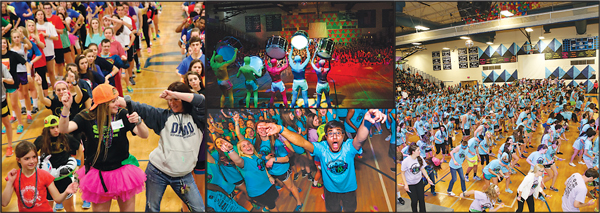
It’s a huge undertaking for Kern and her volunteer team (just think of the logistics of providing food for hundreds of ravenous teenagers through twenty-seven hours of dancing), but she has plenty of interested students to assist, with a 50-person committee to coordinate details and choose area nonprofits that benefit from the event.
This year, there were fifty-seven applications (which must be submitted via a Deep Run parent or guardian) for the twelve organizations that receive funding annually. The student committee reviews each one, and as the school holds fundraisers throughout the year, representatives from the nonprofit applicants are invited to speak about their organization and petition for funding.
At the end of the dance, many beneficiaries are on hand to thank students and to talk a little more about their causes. “It’s very emotional,” said Kern. Last year, a Henrico County middle school teacher who had taught many Deep Run students represented the Leukemia and Lymphoma Society and talked candidly about her family’s personal experiences.
That made a big impression on junior Becca Quick. “At the end, I was really exhausted after hours of dancing, but hearing her story made me realize why I kept doing this for so long. I was helping not only her and her family, but so many other people who were affected.”
The Marathon Dance experience can be transformative, said Abby Bittner. “This dance has changed what I want out of life. It’s helped me prioritize. I want to be a social worker and to work with children. I might want to start a nonprofit organization one day.”
“For us, it’s the start of something,” said sophomore dance committee member Brandon Farbstein. “We get to see firsthand that as high school students, we can make a difference and can change the world, even if it’s a small step at a time.
“It leaves a lasting impression. It’s a ripple effect. We start something, and it grows into something bigger,” said Farbstein.
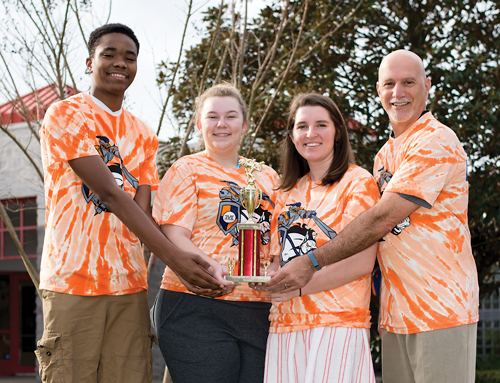
Manchester High School
Striking Out Cancer
Few, if any, Manchester High School students ever met Rich Conklin. Conklin was the JV football coach at rival Clover Hill High School when he was diagnosed with stage 4 colon cancer at age forty-one.
But Manchester students and faculty rallied to honor the memory of Conklin, who succumbed to the disease in 2011. They partnered with Clover Hill students in Strike Out Cancer, a bowling tournament that raises awareness and funds for a local organization called Hitting Cancer Below the Belt, known as HCB2.
The event raised more than $10,500 in last year’s inaugural matchup and another $9,000 this year for HCB2, which seeks to promote awareness, early detection, screenings, and discussion about prevention. The event also gave Manchester bragging rights both years for the most pins knocked down. As a result, Clover Hill administrators had to wear Manchester gear to school the next day.
Word of the tournament spread, and other schools joined the effort this year, increasing the fun and financial support for HCB2. In another Southside matchup, Midlothian was pitted against Monacan High School, and in the West End, Douglas Freeman battled Godwin
High School.
Getting high school students involved was a no-brainer. HCB2 was founded by Conklin’s widow, Melinda, who now is married to Manchester’s Director of Student Activities Roger Cassem. Both are committed to starting cancer education early, hoping to spur actions that will stave off a preventable disease. The American Cancer Society estimates that 1,160 Virginians will die of colorectal cancer in 2016.
“The money helps, but the main thing is education,” Cassem told students. “The diagnoses among people aged twenty to thirty-four is increasing. It used to be an old man’s disease. It’s important to know your family history and risk. We want you to talk about this.” Cassem stressed the word want.
Manchester sophomore Morgan McWilliams believes it’s important to talk about colon cancer, even though it can make people a little squeamish. “You hear so much about breast cancer these days, but not as much about other types of cancer. This event really makes you think… and we need to talk about it.”
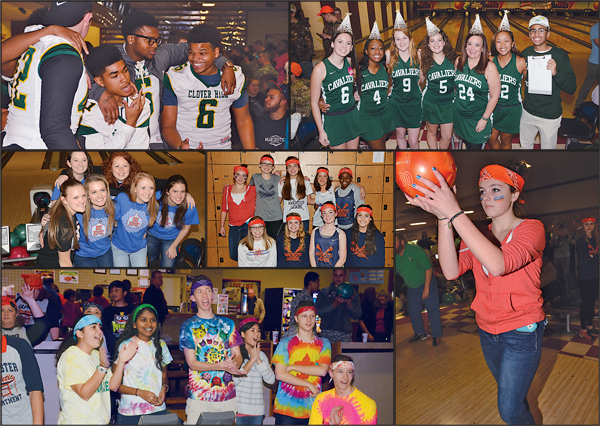
Erica Taylor, a senior at Clover Hill, echoed that sentiment, noting that she’s been aware of the disease since it runs in her family.
Manchester senior Patricia MacCabe feels like she’s making a difference by participating in the Strike Out Cancer event. “Last year, we raised enough money to fund more than fifty colon-oscopies for people who couldn’t afford them. And we were told that some of those people had polyps removed. We’re helping to save lives.”
And while colon cancer awareness materials are displayed and HCB2 hands out information, the Strike Out Cancer event also is a celebration, with music, costumes, food, and good-natured interactions between students and faculty at the rival schools. Conklin’s children and some of his former football players show up to remind younger students that they lost a great coach and mentor to a preventable disease.
Students form teams of five or more players. Many teams are comprised of sports teams or school clubs, everything from JROTC to cheerleaders to the Spanish Club. A lot of faculty join in, too. “I think that seeing the teachers involved really helps,” said Clover Hill senior Alex Sisco, co-president of the school’s SCA. “And besides raising awareness, this is a fun way to bring the whole community together.”
Many of the students’ lives already had been touched by cancer at some point, and participating in Strike Out Cancer gave them a chance to reflect.
Manchester sophomore Clifton Peterson-Davis’s grandmother passed away from cancer. “I’m doing this for her,” he said.
Strike Out Cancer goes further than a few hours at the bowling alley. The knowledge Patricia McCabe has gained working on the fundraiser has steeled her desire to study nutritional science in college. “I want to help people live better lives.”
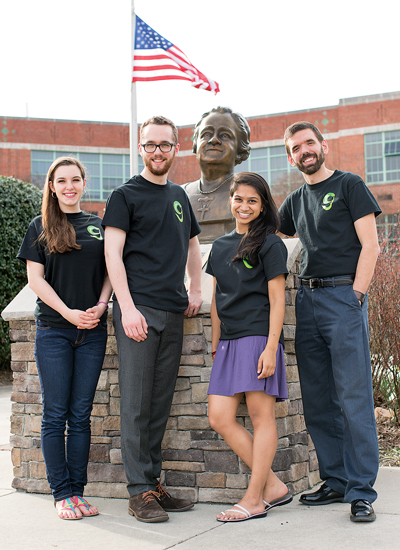
Maggie L. Walker Governor’s School
Blends Education and Philanthropy
A 100-pound sack of rice can sustain a Cambodian family of four for a month. Building a school in Cambodia will sustain generations with knowledge. Reshini Premaratne knows this because she’s raising funds for the rice and the school – and raising awareness of the reasons the family in Cambodia might need help.
“What we’re learning isn’t just hypothetical. We’re really doing something to solve problems in the world,” said Premaratne, a member of Maggie L. Walker Governor’s School Model U.N. (GSMUN) and its director of charitable giving.
More on the rice in a minute.
While many area schools participate in Model U.N. programs, GSMUN (which they pronounce gizmun) takes it further. For nineteen years, they’ve brought in high-profile speakers from around the world and raised funds for nonprofits while raising awareness about global inequities.
“GSMUN has a dual purpose: education and philanthropy,” explained John Metz, a Maggie Walker senior who serves as secretary-general of the event.
The GSMUN annual conference is where it all comes together.
“It’s completely student-led and student-run,” marvels Max Smith, a social studies teacher who has served as the group’s faculty sponsor for eight years. “I allow them to ‘blue sky’ the whole thing.”
And they have run with it, coordinating the logistics of bringing in about 500 students from thirty-five schools and raising about $10,000 annually in recent years. The students hold bake sales, sell candy grams, and sponsor benefit concerts throughout the school year, raising about $2,000 before the weekend-long conference even begins. During the conference, they can raise about $3,000 through T-shirt sales, more bake sales, and other merchandise sales. And then they raise another $5,000 in direct giving through committee competitions.

Along the way, GSMUN members explain the cause they’re supporting. This year, students selected One Hundred Pounds of Hope (OHPOH, which got its name from the hundred-pound bags of rice it donates), a Virginia-based organization that provides food, shelter, and education to children in rural Cambodia. OHPOH’s founder, Amanda Prak Sam, is a survivor of the Cambodian genocide, and, like beneficiaries in years past, spoke to students during GSMUN’s conference last month, explaining exactly how their donation supports the project.
The funds will help repair and renovate a village schoolhouse in Battambang, Cambodia, allowing more than 500 students to have the supplies and facility to learn. In 2015, the conference supported Apne Aap Women Worldwide, an India-based organization devoted to ending human trafficking and protecting women’s rights.
But while students are raising money, they’re also taking a deep dive into the real world. Model U.N. offers students a chance to simulate the U.N. General Assembly, Security Council, and other multilateral bodies. Participation gives students a look into the world of diplomacy and negotiation, stepping into the shoes of ambassadors of UN member states, from Afghanistan to Zimbabwe, and debating current issues on a massive agenda.
The students, known as delegates in Model U.N. parlance, prepare draft resolutions, plot strategy, negotiate with supporters and adversaries, resolve conflicts, and navigate the U.N.’s rules of procedure – all in the interest of mobilizing international cooperation to resolve problems.
Each year, in partnership with The Richmond Forum, a keynote speaker addresses prominent issues of policy and global affairs. Last year, Ben Bernanke, former chairman of the Federal Reserve, spoke to a gathering of roughly 500 delegates. This year, the conference hosted the Honorable Julia Gillard, former prime minister of Australia.
In the spirit of equality, the Maggie Walker team worked to attract underrepresented schools from around the state to the conference, with Director-General Zoe Nelson leading that initiative. Nelson added that the planning team this year also made a commitment to holding a sustainable conference, adopting a number of initiatives from reducing paper use to having BPA-free water bottles. “It’s about changing attitudes.”
Metz believes students’ attitudes are changing as they learn more about world issues and work through possible resolutions. “We can have a lot of impact on students here and abroad.”
Reshini Premaratne agrees and connects the Richmond-areas students’ efforts to the challenges of children and families on the other side of the world. “We are using the gift of education we’ve been given here to help others have the same.”


